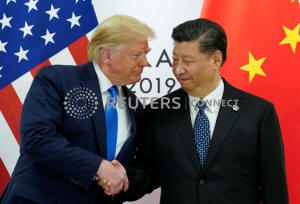|
'Back on track': China and U.S. agree to
restart trade talks
 Send a link to a friend
Send a link to a friend
 [June 29, 2019]
By Roberta Rampton and Michael Martina [June 29, 2019]
By Roberta Rampton and Michael Martina
OSAKA (Reuters) - The United States and
China agreed on Saturday to restart trade talks with Washington holding
off new tariffs on Chinese exports, signaling a pause in the trade
hostilities between the world's two largest economies.
Commenting on a long-running dispute over China's Huawei, President
Donald Trump said U.S. firms would be able to sell components to the
world's biggest telecoms network gear maker where there was no national
security problem.
The truce offered relief from a nearly year-long trade standoff in which
the countries have slapped tariffs on billions of dollars of each
other's imports, disrupting global supply lines, roiling markets and
dragging on global economic growth.
"We're right back on track and we'll see what happens," Trump told
reporters after an 80-minute meeting with Chinese President Xi Jinping
on the sidelines of a summit of leaders of the Group of 20 (G20) major
economies in Osaka, western Japan.
Trump said while he would not lift existing import tariffs, he would
refrain from slapping new levies on an additional $300 billion worth of
Chinese goods - which would have effectively extended tariffs to
everything China exports to the America.

"We're holding back on tariffs and they're going to buy farm products,"
he said at a news conference, without giving any details of China's
future agricultural product purchases.
"If we make a deal, it will be a very historic event."
He gave no timeline for what he called a complex deal but said he was
not in a rush. "I want to get it right."
HUAWEI HOPES
On Huawei, Trump said the U.S. commerce department would meet in the
next few days on whether to take it off a list of firms banned from
buying components and technology from U.S. companies without government
approval.
China welcomed the step.
"If the U.S. does what it says, then of course, we welcome it," said
Wang Xiaolong, the Chinese foreign ministry's envoy for G20 affairs.
U.S. microchip makers also applauded the move.
"We are encouraged the talks are restarting and additional tariffs are
on hold and we look forward to getting more detail on the president's
remarks on Huawei," John Neuffer, president of the U.S. Semiconductor
Association, said in a statement.
Huawei has come under mounting scrutiny for over a year, led by U.S.
allegations that "back doors" in its routers, switches and other gear
could allow China to spy on U.S. communications.
While the company has denied its products pose a security threat, the
United States has pressed its allies to shun Huawei in their fifth
generation, or 5G, networks and has also suggested it could be a factor
in a trade deal.
The problems at Huawei have filtered across to the broader chip
industry, with Broadcom Inc <AVGO.O> warning of a broad slowdown in
demand and cutting its revenue forecast.
RELIEF AND SCEPTICISM
In a lengthy statement on the two-way talks, China's foreign ministry
quoted Xi as telling Trump he hoped the United States could treat
Chinese companies fairly.
[to top of second column]
|

President Donald Trump meets with China's President Xi Jinping at
the start of their bilateral meeting at the G20 leaders summit in
Osaka, Japan, June 29, 2019. REUTERS/Kevin Lamarque

On the issues of sovereignty and respect, China must safeguard its
core interests, Xi was cited as saying.
"China is sincere about continuing negotiations with the United
States ... but negotiations should be equal and show mutual
respect," the foreign ministry quoted Xi as saying.
Trump had threatened to extend existing tariffs to almost all
Chinese imports into the United States if the meeting brought no
progress on wide-ranging U.S. demands for reforms.
Financial markets are likely to breathe a sigh of relief on news of
the resumption in U.S.-China trade talks.
"Returning to negotiations is good news for the business community
and breathes some much needed certainty into a slowly deteriorating
relationship," said Jacob Parker, a vice-president of China
operations at the U.S.-China Business Council.
"Now comes the hard work of finding consensus on the most difficult
issues in the relationship, but with a commitment from the top we're
hopeful this will put the two sides on a sustained path to
resolution," he said.
Some, however, warned the pause might not last.
"Even if a truce happens this weekend, a subsequent breakdown of
talks followed by further escalation still seems likely," Capital
Economics said in a commentary on Friday.
The United States says China has been stealing American intellectual
property for years, forces U.S. firms to share trade secrets as a
condition for doing business in China, and subsidizes state-owned
firms to dominate industries.
China has said the United States is making unreasonable demands and
must also make concessions.
Talks collapsed in May after Washington accused Beijing of reneging
on reform pledges. Trump raised tariffs to 25% from 10% on $200
billion of Chinese goods, and China retaliated with levies on U.S.
imports.
The U.S.-China feud had cast a pall over the two-day G20 gathering,
with leaders pointing to the threat to global growth.
In their communique, the leaders warned of growing risks to the
world economy but stopped short of denouncing protectionism, calling
instead for a free, fair trade environment after talks some members
described as difficult.

(Reporting by Roberta Rampton, Michael Martina and Chris Gallagher
in Osaka; Additional reporting by Koh Gui Qing in New York, Ben
Blanchard in Beijing and Leika Kihara in Osaka; Writing by Linda
Sieg and Malcolm Foster; Editing by Clarence Fernandez and Himani
Sarkar)
[© 2019 Thomson Reuters. All rights
reserved.]
Copyright 2019 Reuters. All rights reserved. This material may not be published,
broadcast, rewritten or redistributed.
Thompson Reuters is solely responsible for this content. |